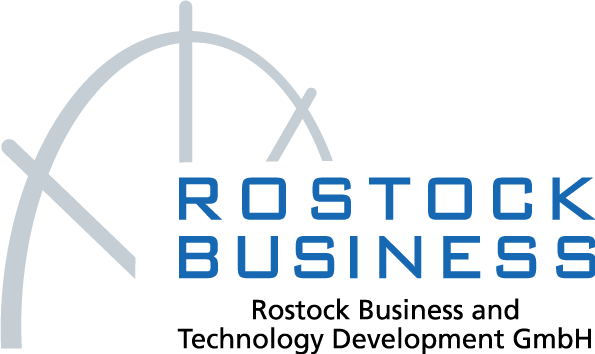Rostock Business and Technology Development GmbH
Rostock Business is the economic development agency of the Hanseatic city of Rostock that serves as the "one-stop-agency" for the largest city in North-Eastern Germany. We are a non-profit organization that works as a consultancy to assist companies with: research and matching of supplier/customer profiles, establishing contacts to local networks and consultancy in the settlement process.
Rostock Business regards itself as a structure-giving and capable service provider for making scientific competencies and research results better known and putting them into practice, and forming a joint platform for collaborations with business sector partners. Our service features contribute to increasing the integration of the Hanseatic City's high scientific potential with the economy. Together with partners, we support innovative ideas, from the origin to further development, to ultimately realisation into products and services through to marketing. With this work we want to support, in particular, the competitiveness of small and medium-sized companies, market research results and ensure sustainable jobs in the Hanseatic city of Rostock.
Contact
Rostock Business and Technology Development GmbHGesellschaft für Wirtschafts- und Technologieförderung Rostock mbH
Schweriner Straße 10/11
18069 Rostock, Germany
Gert Proba, Project Manager
E-mail: proba@rostock-technology.de
Web: www.rostock-business.com/de/index.html

Information about the RIS3 of the partner region:
Regional level document: „Regional Innovation Strategy 2020 for Mecklenburg-Western Pomerania“ (February 2013)
Legal Owner: Ministry for Economic Affairs, Construction and Tourism of Mecklenburg-West Pomerania
Web: www.regierung-mv.de/Landesregierung/wm/Technologie/Technologiepolitische-Schwerpunkte (only available in German)
Key challenges for innovation policy
The crucial weaknesses of the regional innovation system in Mecklenburg-Western Pomerania are the low level of R&D investment and the insufficient innovation activities of small and medium enterprises. Therefore, a key challenge for innovation policy in Mecklenburg-Western Pomerania is to increase the activities of research, development and innovation particularly in small and medium enterprises. By directly promoting R&D activities within local companies, the federal state supports SMEs in particular to develop new products, services and technical procedures and to bring them to relevant markets. This also involves the collaboration of companies and research institutions. By promoting joint research projects, technology-oriented networks and the commercial exploitation of scientific research results, knowledge and technology transfer should increase.
In comparing the German federal states, the performance level of application-oriented research institutes in Mecklenburg-Western Pomerania is still not enough. This deficit is doubly difficult given the low R&D industry participation in Mecklenburg-Vorpommern, since about three quarters of total R&D capability in Mecklenburg-Western Pomerania is focussed on universities and other research institutions. By giving more funds to application-oriented research, innovation capacities will be expanded. This is intended to make the knowledge of universities and research institutes available especially for SMEs.
Smart Specialisation areas in Mecklenburg-Vorpommern
Smart Specialisation areas that were selected at the regional level for Mecklenburg-Western Pomerania are:- Energy and climate
- Sustainable production techniques and new materials
- Health / life sciences
- Food industry
- Mobility
- Information and communication technologies.
Main objectives of the RIS3
The Regional Innovation Strategy 2020 for Mecklenburg-Western Pomerania aims to further Mecklenburg-Western Pomerania’s research and technology profile and impose priorities in funding policy for the coming years. In its final version, the strategy details twelve focal points:- Concentrate future regional technology policies on the abovementioned six "areas with future potential"
- Establish and maintain the regional strategy council's central role in determining the general orientation of future regional technology policies
- Co-finance promising projects that receive funding from the national level
- Continue to support co-operative projects with regional subsidies,
- Continue to leverage federal support for small- and medium-sized enterprises
- Provide risk capital for research and development
- Establish two centres of competence for R&D and innovative technologies
- Support the future expansion of technology parks
- Support IPR strategies at regional universities and public research institutions as well as the concrete regional valorisation of their scientific results
- Establish a communication platform for regional research and development
- Launch an "innovation offensive" in the craft sector
- Support product innovation in the "areas with future potential" through specific competitions for funding.
Funding
Small and medium enterprises usually lack the money for their own developments. They need financial assistance and close contacts with research institutions. With 168 million euros for industrial research and development, the promotion of collaborative research in the structural fund period 2014-2020 is a key focus in Mecklenburg-Western Pomerania.The funding is divided in five measures:- Research and development projects as single operational projects and collaborative projects
- Feasibility studies
- Commercial protection rights activities by SMEs
- Innovation advisory services and innovation support services and
- Process innovation.
Additional funding is available and assigned from different EU programmes & national budgets. In addition, Mecklenburg-Western Pomerania has initiated a venture capital fund for young innovative companies. This venture capital fund has a volume of € 10 million to alleviate seed money funding.

